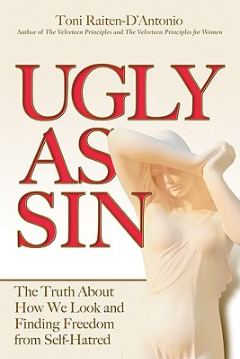This review contains affiliate links, which earn me a small commission when you click and purchase, at no extra cost to you. Thank you for supporting my small business and allowing me to continue providing you a reliable resource for clean book ratings.
We’ve all seen, and probably read, those image books. How we’re supposed to accept the way we are (or help our daughters do so). How we can be our best selves by doing X or Y or Z. How we can embrace ourselves and stop loathing ourselves.
And yet, none of them really get to the root of the problem: we all fear, on some level, rejection because we don’t measure up to some (unattainable) standard of beauty. Because we are, gasp, ugly. Which is exactly what Raiten-D’Antonio tackles head-on.
The basic thesis is that we — especially as women, but really everyone — spend so much of our time being afraid of getting/being ugly that it affects everything we do. In the way we relate to people, in the way we treat ourselves. She asserts that it’s the root cause of eating disorders, that it may (not necessarily, but quite probably) be the reason we spend so much time exercising, or on hair dye or fashion. We have taken what should be natural — aging, especially, but also just the way we naturally look — and have transformed it into something unreal.
It’s a comprehensive, if abbreviated, look at the role of beauty through the ages, especially in Western culture. Raiten-D’Antonio covers everything from the origins of ugliphobia through its place in culture, relationships, and self-awareness. It’s a bit too glossed-over to be truly thorough, and many of the ideas have been written about elsewhere using different language: be true to yourself; improve your character, not your appearance. But one has to give Raiten-D’Antonio some credit: she is blunt and forthright not only about being ugly, but about her own experience with it. This book is almost a memoir: it’s her personal experience with accepting herself the way nature made her and her determination to disregard what society wants her to be. And, hopefully, reach others like her.
And the solution? It’s simplistic, and one I have heard many times before, but possibly could work: give in to your better self, and stop looking at the outside. Improve the inside. And if you do give into the beauty regimen, make sure it’s something you want to do, not one that you feel you have to do. It’s not something that will change the beauty-obsessed culture overnight, but perhaps, one person at a time, we can all become more at peace with who we are.
Thought-provoking, to say the least.
Rated: Moderate, for five uses of strong language and assorted mild language.
Click here to purchase your copy of Ugly as Sin on Amazon.




